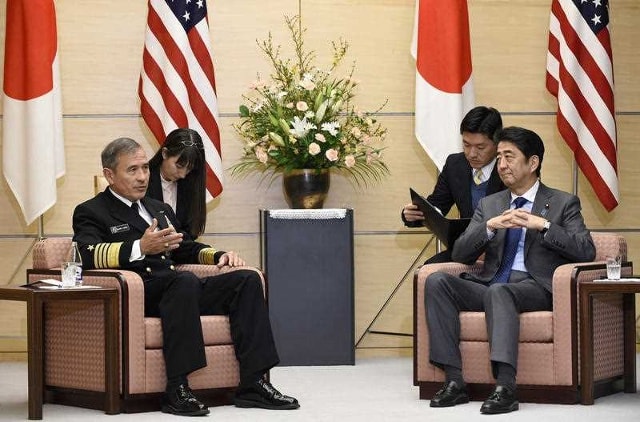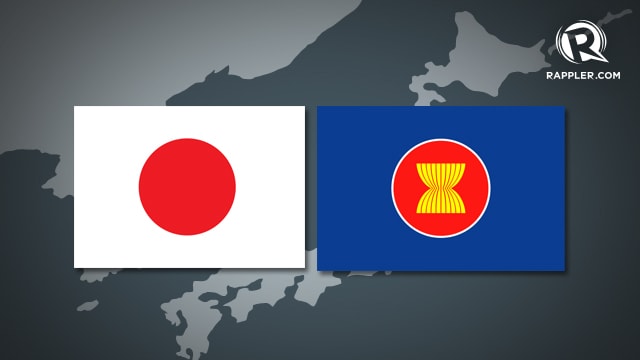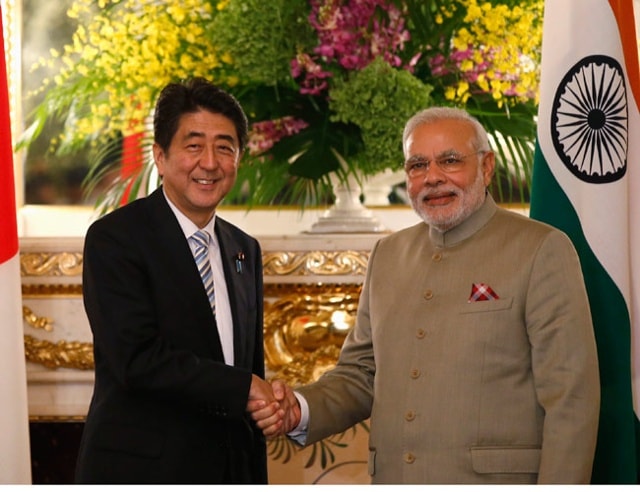Japan's vision of East Asian security order
(Baonghean.vn) - The regional order in East Asia is constantly changing. The relative decline in US power in Asia has led to new challenges. The principles, regulations, practices and methods for managing the international agenda are raising many questions.
 |
| US Navy Admiral Harry B. Harris Jr., commander of US forces in the Pacific, talks with Japanese Prime Minister Shinzo Abe during a meeting at the Prime Minister's Office on February 16. Photo: AP. |
The extent to which the United States is willing to maintain an active role in East Asia, along with the attitudes of China and key groups such as ASEAN, will shape the future of the region. How key actors respond to the changing security environment will play a key role in determining the future of the security order in East Asia.
So what does this mean for Japan?
Japan is currently the strongest supporter of the US-led order in the region, both in terms of security and economics. After the short tenure of former Prime Minister Yukio Hatoyama (September 2009-June 2010), Japan lost its aspiration to be the “architect” of the regional order. Instead, the country focused on integrating its Asia policy with its bilateral relationship with the US.
Japan has not always believed in America’s primacy in Asia. In the past, it has emphasized the role of regional organizations, including mechanisms such as ASEAN+3 and ASEAN+6. It has also actively pursued bilateral diplomacy with Southeast Asian countries under the Fukuda Doctrine, which was introduced in 1977 and focused on building peaceful and cooperative relations with ASEAN members.
But over the past decade, Japanese foreign policy makers have increasingly viewed their country’s relations with Southeast Asia through the prism of the US alliance. Regardless of which party is in power, Japan’s foreign policy is clearly aimed at strengthening US leadership in the region.
 |
| Japan always focuses on building peaceful and cooperative relations with ASEAN members. Photo: Internet. |
In support of the US alliance framework, Japan has enhanced its security cooperation with most ASEAN countries, substantially improving bilateral relations with ASEAN countries to increase defense exchanges. Japan’s stance on the Trans-Pacific negotiations—which receive priority over its other economic partnerships in the region—also demonstrates a strong commitment to ensuring continued US engagement in the region. Tokyo policymakers calculate that it will gain additional strategic benefits from increasing the US position in the region. This view is perhaps more deeply rooted in Japan than anywhere else, including Australia or even the United States.
In April 2015, Japan and the United States issued a joint statement and updated guidelines for U.S.-Japan defense cooperation, emphasizing bilateral and trilateral cooperation in security capacity building efforts for Southeast Asian countries. The Abe administration has also successfully deepened U.S.-India security cooperation, especially regarding defense and civil nuclear cooperation, as a manifestation of Japan’s “Securitization” of its diplomacy in Asia.
Japan’s actions are meant to complement the so-called “pivot” or “rebalance” to Asia by the United States, but the change in Japanese policy actually predates the US pivot strategy. The first signs of this new foreign policy orientation began during Mr. Abe’s first term in 2006-2007.
 |
| The Abe administration has also successfully deepened US-India security cooperation. Photo: Internet. |
And tensions remain between the US and Japanese approaches to security in East Asia. Japan has been more assertive than its partners, eager to counter China’s growing influence and address maritime challenges through rules-based mechanisms. This stance stems from Japan’s view of China, which has changed as China’s political influence and crises over the disputed Senkaku/Diaoyu Islands have grown.
Some elements of Japan’s traditional Asian diplomacy remain in bilateral relations, but over the past decade the country has largely focused on security. The weight of security concerns in its foreign policy has led Japanese diplomats to push for a common stance with ASEAN on maritime disputes with China.
The much-anticipated role of ASEAN in Japan’s foreign policy vision has not changed in general. Japan wants to encourage ASEAN to become stronger and promote the process of building a common community. Even outside the ruling circles, many Japanese experts still highly value ASEAN’s role in the regional architecture.
As long as the majority of ASEAN countries resist external pressure from any third party, promoting ASEAN will be beneficial to Japan. This is because ASEAN can help Japan promote regionalism while pursuing economic and security mechanisms that include the United States.
Japan’s move shows that in its strategic recalculation, maintaining American influence is key to preserving the regional order. Tokyo recognizes that its power alone is not enough to shape that order, so it needs to build alliances with regional partners with similar political goals, such as Australia.
Japan’s diplomacy toward East Asia has undergone a significant transformation. The strategic vision that underpins the US-Japan alliance has been stretched to underpin Tokyo’s diplomacy toward East Asia as a whole. The expansion of the US-Japan alliance logic has inadvertently affected Japan’s ability to pursue a truly inclusive regional order. It is time for its foreign policy to embrace the advantages of comprehensive multilateralism.
Thu Giang
(According to EAF)
| RELATED NEWS |
|---|


